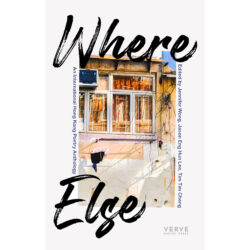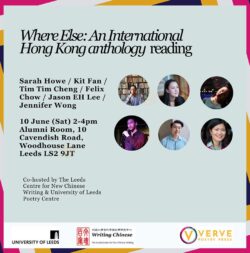June 2023: Where Else: An International Hong Kong Anthology
 This month, rather than focusing on just one author, we're highlighting a ground-breaking poetry collection - Where Else: An International Hong Kong Anthology, published this month by Verve Poetry Press, edited by Jennifer Wong, Jason Eng Hun Lee, and Tim Tim Cheng.
This month, rather than focusing on just one author, we're highlighting a ground-breaking poetry collection - Where Else: An International Hong Kong Anthology, published this month by Verve Poetry Press, edited by Jennifer Wong, Jason Eng Hun Lee, and Tim Tim Cheng.
Featuring both established and emerging Hong Kong poets across generations and continents, this unique anthology offers a glimpse into an exciting, diverse range of voices that make up the diasporic imagination of the contemporary Hong Kong poetry community. Adopting a diasporic approach, the anthology encompasses both native Hong Kong writers as well as expatriate and mixed-race voices who were born or have lived in the city.
The anthology sheds light on some poignant, wide-ranging themes such as migration, identity, gender, language, belonging, environment that underpin the city of Hong Kong, a place situated uniquely between the East and the West, in the 21st century. The book also features a selection of artworks from some of Hong Kong’s most talented artists, inviting the reader to make connections between the visual images and the text.
We're very grateful to Verve, and to the editors and poets, for letting us feature five poems from the collection - by Roland Tsoi, Tammy Lai-Ming Ho, James Shea, Chris Song, and Collier Nogues - giving a taste of the range of themes and approaches within its pages. You can read the poems here.
 We're also delighted to be hosting a launch event, in partnership with Verve and the University of Leeds Poetry Centre, on Saturday June 10th. This will feature all of the editors, as well as poets Felix Chow, Kit Fan, and Sarah Howe.
We're also delighted to be hosting a launch event, in partnership with Verve and the University of Leeds Poetry Centre, on Saturday June 10th. This will feature all of the editors, as well as poets Felix Chow, Kit Fan, and Sarah Howe.
To quote from editor Jennifer Wong in her introduction to the collection, 'To me, it seems that there isn't a clear-cut, stable definition of what a 'Hong Kong poet' is. What we would like to bring is the space and willingness for people to appreciate these writings, and I can't wait to see how readers will respond to the thematic and geographical range of voices that we have captured, and to discover the dialogues between their works.'
